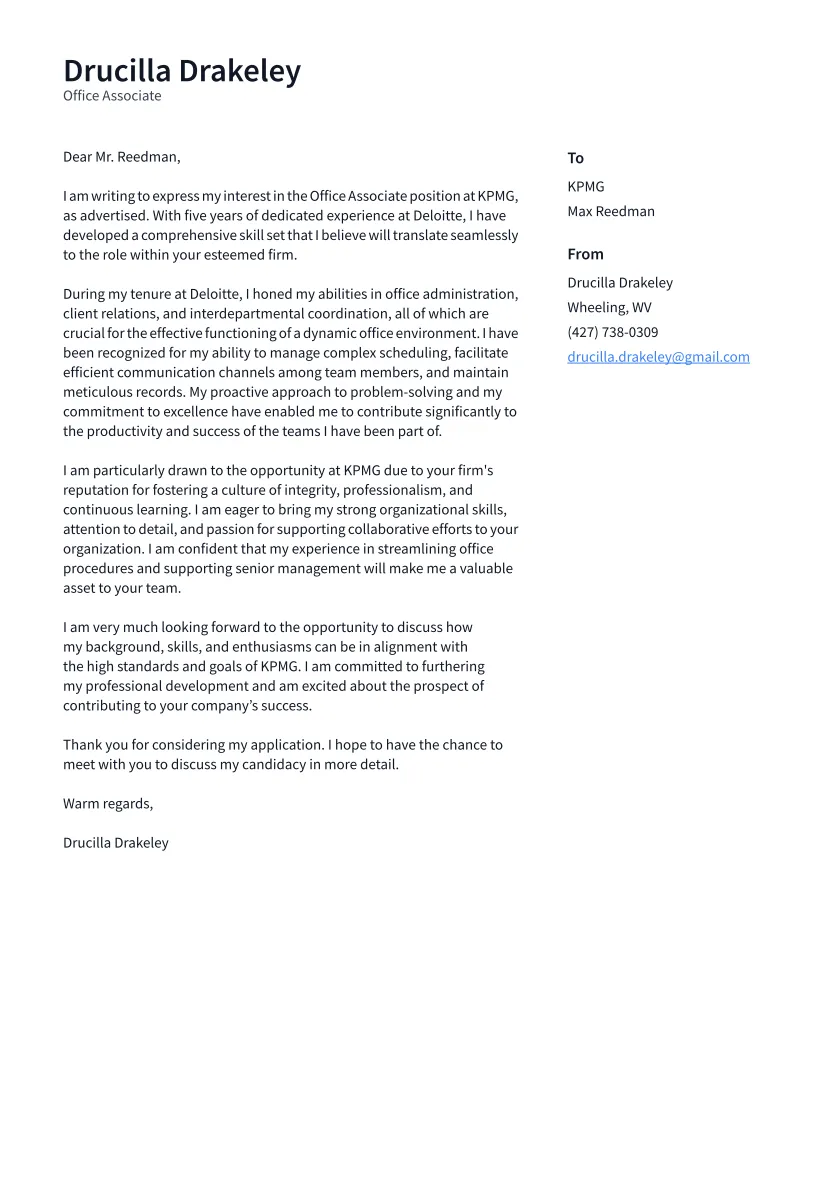What is a Cover Letter for Office Job?
A cover letter for an office job is a crucial document that accompanies your resume when applying for a position. It serves as your introduction to the hiring manager and provides an opportunity to highlight your relevant skills, experience, and enthusiasm for the role. Unlike a resume, which presents a factual summary of your qualifications, a cover letter allows you to express your personality, explain why you are a good fit for the company, and showcase your writing and communication skills. It’s your chance to make a strong first impression and convince the employer to take a closer look at your application. The best office job cover letters are tailored to the specific job and company, demonstrating that you have done your research and are genuinely interested in the opportunity. A well-crafted cover letter can significantly increase your chances of landing an interview and ultimately, the job.
Why You Need an Office Job Cover Letter
In today’s competitive job market, a cover letter is not just a formality it’s an essential tool for success. For office jobs, where communication and interpersonal skills are highly valued, a cover letter allows you to demonstrate these abilities directly. It provides context to your resume, explaining why your experience aligns with the job requirements and how you can contribute to the company’s goals. Moreover, a cover letter allows you to address any potential concerns the hiring manager might have, such as gaps in your employment history or a career change. It also allows you to express your enthusiasm for the role and the company, which can set you apart from other applicants. A cover letter is your chance to persuade the employer that you are the right candidate for the job. Without one, you risk appearing less engaged and less prepared, which can hurt your chances of getting an interview. Therefore, crafting a compelling cover letter is a critical step in your job search strategy.
Essential Elements of an Office Job Cover Letter
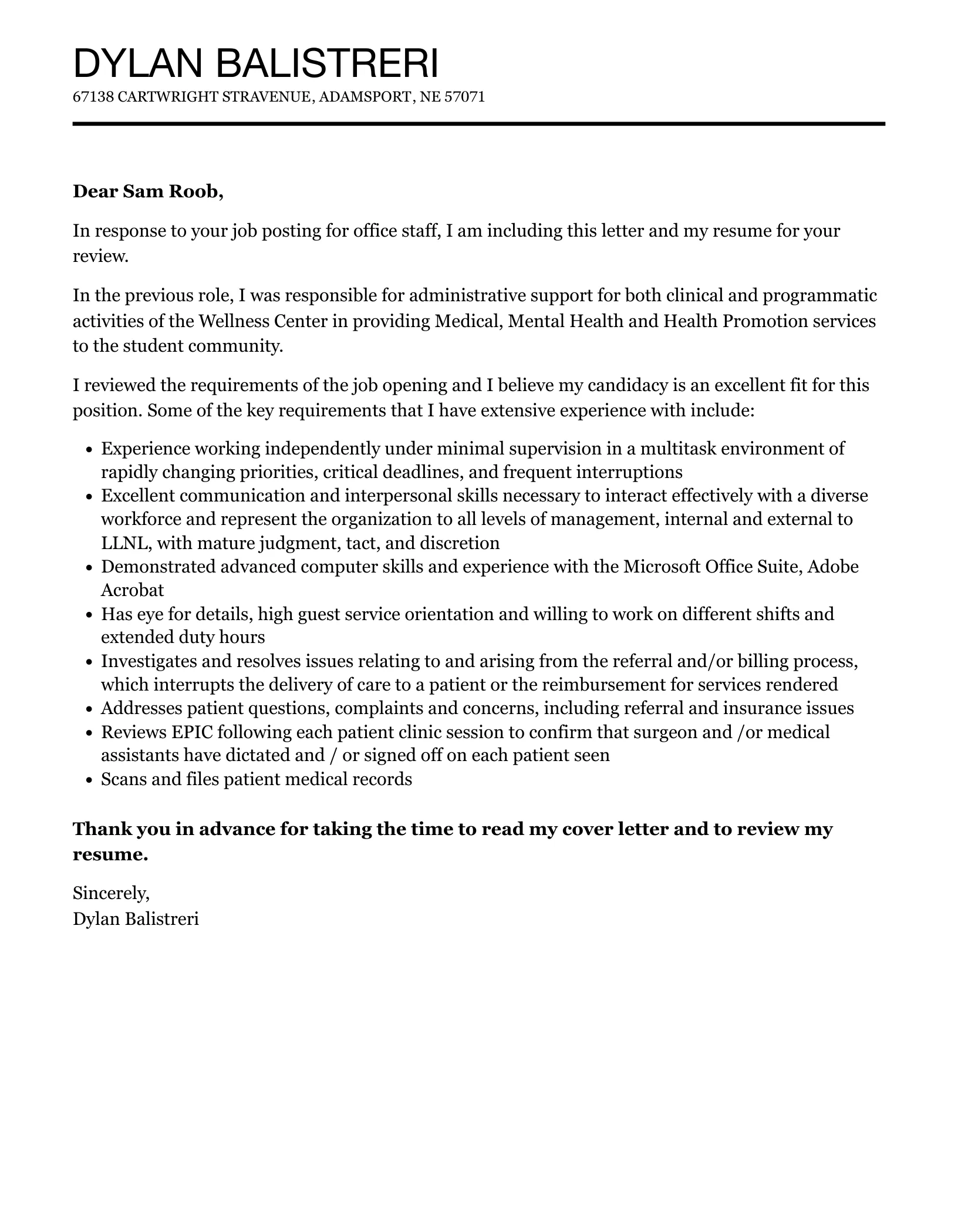
A well-structured office job cover letter typically includes several key elements that work together to create a compelling narrative. These elements ensure that your letter is professional, informative, and tailored to the specific job. First, you’ll need to start with your contact information, providing a clear way for the employer to reach you. Next, address the hiring manager by name whenever possible. The opening paragraph should grab the reader’s attention, stating the position you are applying for and mentioning where you found the job posting. The body of the letter should highlight your relevant skills and experience, showcasing your achievements with specific examples. Finally, the closing paragraph should reiterate your interest in the role, express your gratitude for their time, and include a call to action, such as inviting them to contact you for an interview. A well-written cover letter will contain these elements and improve your chances of success.
Contact Information
At the top of your cover letter, include your contact information. This typically includes your full name, phone number, email address, and possibly your LinkedIn profile URL. Ensure your email address is professional (e.g., john.doe@email.com) and not a casual or unprofessional one. Make sure your phone number is accurate, and the voicemail is set up with a professional greeting. This information should be easy to find, usually aligned to the left or right, to allow the hiring manager to quickly contact you if they are interested in your application.
Professional Greeting
Always address the hiring manager by name if possible. Research the company to find out the name of the person responsible for hiring; this shows that you have taken the time to learn about the company and are genuinely interested in the position. If you cannot find the hiring manager’s name, use a professional greeting such as “Dear Hiring Manager” or “Dear [Department Name] Team.” Avoid generic greetings such as “To Whom It May Concern,” as they lack personalization and may make your letter appear less engaging. Correct addressing shows attention to detail and a commitment to professional communication.
Opening Paragraph Capture Attention
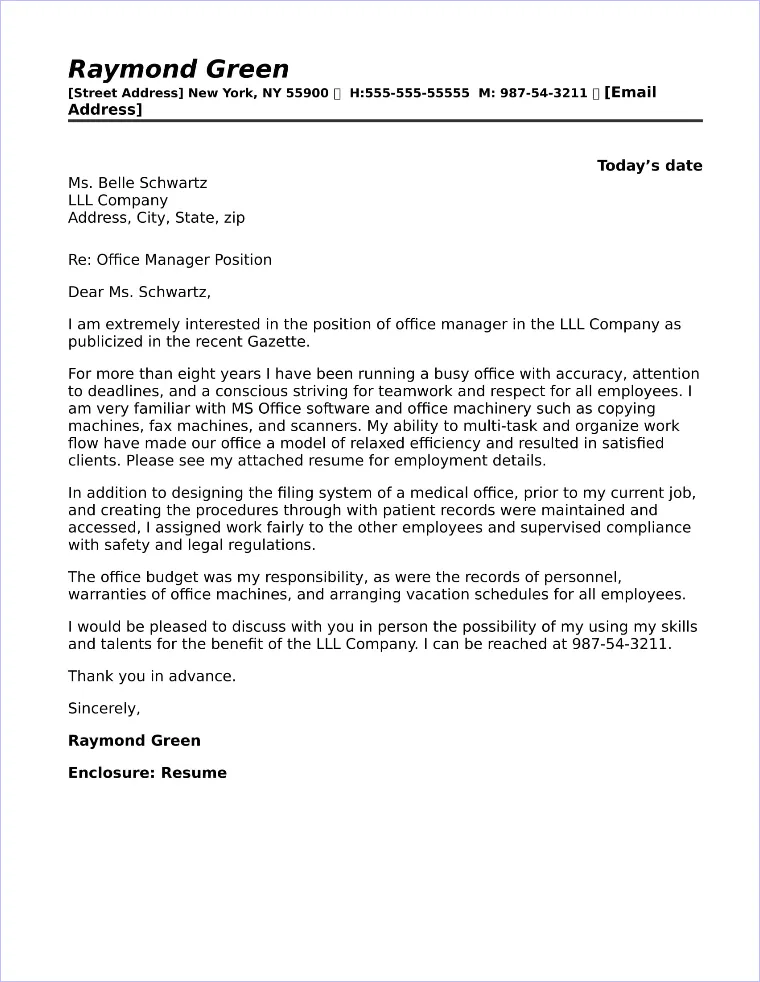
The opening paragraph is your first chance to grab the hiring manager’s attention. Start by clearly stating the position you are applying for and where you found the job posting (e.g., Indeed, company website, etc.). Then, make a brief statement about why you are interested in the position and the company. You might mention a specific aspect of the role that excites you or a company value that resonates with you. Keep it concise and focused, aiming to create an immediate positive impression. By starting strong, you encourage the hiring manager to read the rest of your cover letter and consider your application.
Highlight Relevant Skills and Experience
The body of your cover letter should highlight the skills and experience that make you a strong candidate for the office job. Focus on the requirements listed in the job description and explain how your qualifications align with them. Provide specific examples of your accomplishments, using the STAR method (Situation, Task, Action, Result) to demonstrate your abilities. For instance, if the job requires strong organizational skills, you might describe a situation where you successfully managed multiple projects simultaneously, highlighting the actions you took and the positive results achieved. This is your opportunity to show, not just tell, why you are the best person for the job.
Tailor your skills
Tailoring your skills means aligning the skills you possess with the requirements of the specific office job you’re applying for. Carefully review the job description and identify the key skills the employer is looking for. These might include communication, organization, time management, proficiency in specific software, or customer service abilities. In your cover letter, highlight the skills that match the job requirements, providing specific examples of how you have used those skills successfully in the past. This focused approach demonstrates that you understand the job’s demands and are prepared to excel in the role. Generic cover letters that don’t demonstrate a clear match to the job description are less likely to succeed.
Showcase Your Achievements
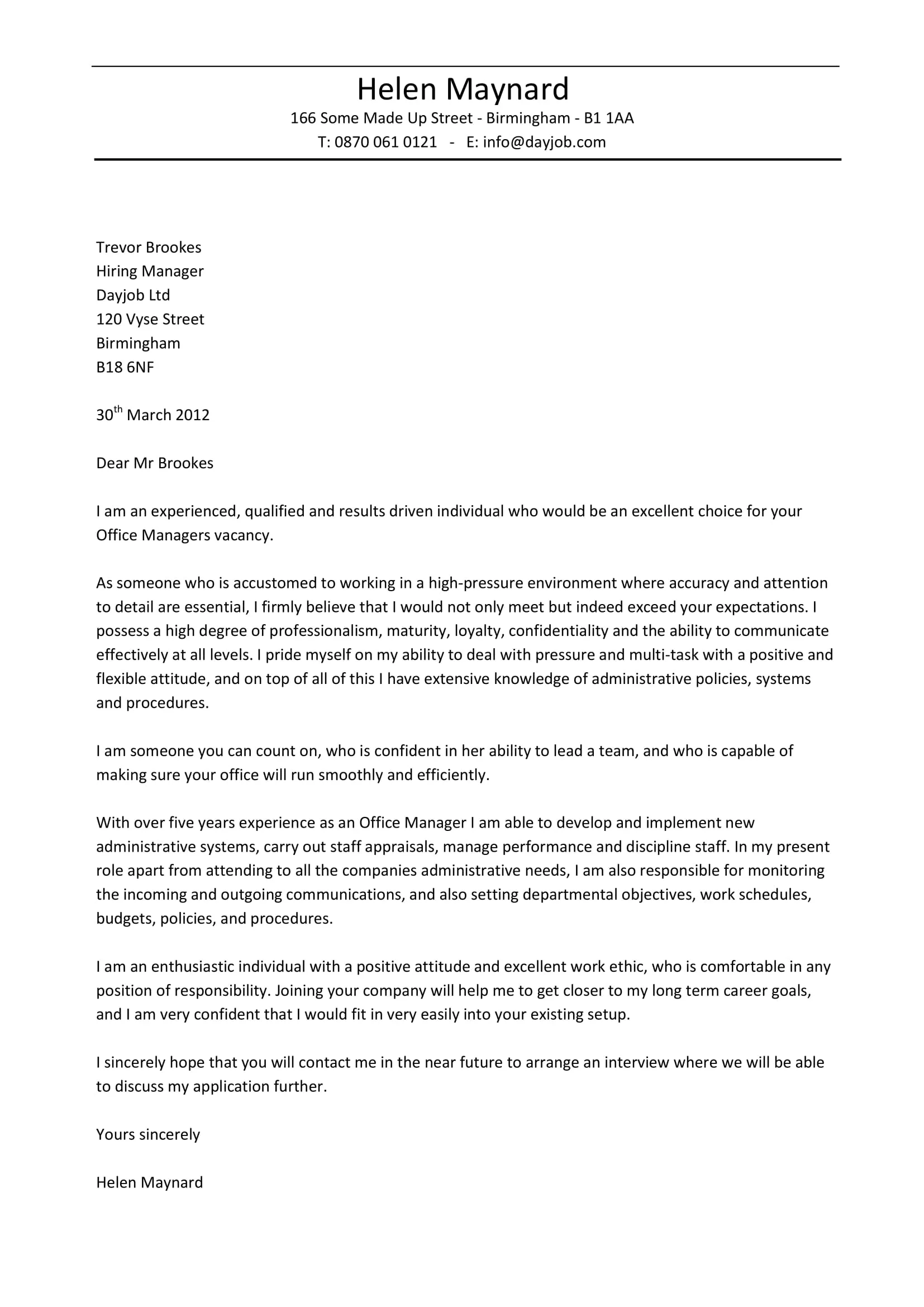
Instead of simply listing your job duties, use your cover letter to showcase your achievements. Provide concrete examples of what you have accomplished in previous roles. Did you improve efficiency? Did you reduce costs? Did you streamline a process? Use the STAR method to describe the situation, the task you were given, the action you took, and the results you achieved. Quantify your accomplishments whenever possible. For example, instead of saying, “Managed customer inquiries,” state, “Resolved an average of 50 customer inquiries per day, maintaining a 95% satisfaction rate.” Highlighting your achievements demonstrates your value to potential employers and makes your application more compelling. Focus on results and how you made a difference in your previous roles.
Quantify Your Accomplishments
Quantifying your accomplishments means using numbers and data to demonstrate the impact of your work. Instead of saying “Improved customer service,” state “Increased customer satisfaction scores by 15% within six months.” Instead of saying “Managed social media accounts,” state “Grew social media followers by 30% in one year, resulting in a 10% increase in leads.” Quantifiable achievements provide concrete evidence of your skills and abilities and make your cover letter more persuasive. Consider the impact of your work – was it financial, operational, or in terms of efficiency? Use metrics to highlight your successes and demonstrate the value you can bring to the company. Employers are far more impressed with measurable results than vague descriptions.
Express Your Enthusiasm and Interest
Expressing genuine enthusiasm for the position and the company is vital in your cover letter. Show your passion for the role and demonstrate that you have researched the company and understand its mission, values, and culture. Mention specific aspects of the company or the role that excite you. Connect your skills and experience to the company’s goals and explain how you see yourself contributing to their success. Be authentic and show that you are genuinely interested in the opportunity, not just looking for any job. This enthusiasm will make your application more memorable and increase your chances of getting an interview.
Demonstrate Company Knowledge
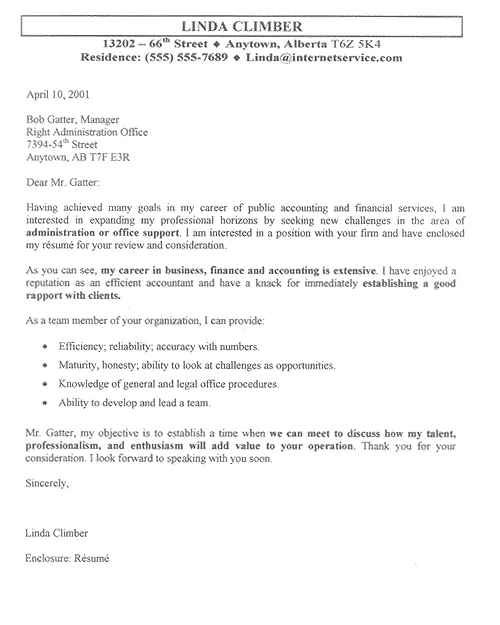
Demonstrate that you have done your homework by showing that you have researched the company. In your cover letter, mention specific projects, products, or initiatives that resonate with you. This can include the company’s values, mission, or recent accomplishments. Understanding the company’s culture and showing how your goals align with theirs is crucial. Refer to the company’s website, social media, and recent news articles. This personalized approach demonstrates that you are genuinely interested in the position and have taken the time to learn about the employer, setting you apart from applicants who submit generic letters. By making specific connections between your skills and the company’s objectives, you can strengthen your chances of getting the interview.
Closing the Cover Letter
Your closing paragraph should reiterate your interest in the role, thank the hiring manager for their time and consideration, and include a clear call to action. Summarize why you are a good fit for the position and reiterate your enthusiasm. Thank the hiring manager for considering your application. The call to action is a crucial element; it prompts the hiring manager to take the next step, such as inviting them to contact you for an interview. You might state that you are available for an interview at their earliest convenience, or express that you are looking forward to hearing from them soon. This final paragraph reinforces your professionalism and encourages the hiring manager to move forward with your application.
Call to Action
The call to action is a key element of your cover letter’s closing paragraph. It’s a direct statement that prompts the hiring manager to take the next step. This could be an invitation to contact you for an interview or a statement indicating your eagerness to discuss your qualifications further. Ensure your call to action is clear, concise, and professional. Avoid passive language or uncertainty. Instead, be direct and show initiative. For instance, you could say, “I am available for an interview at your earliest convenience” or “I look forward to the opportunity to discuss my qualifications in more detail.” A strong call to action motivates the hiring manager and shows your genuine interest in the position, helping you advance in the job search process.
Proper Formatting
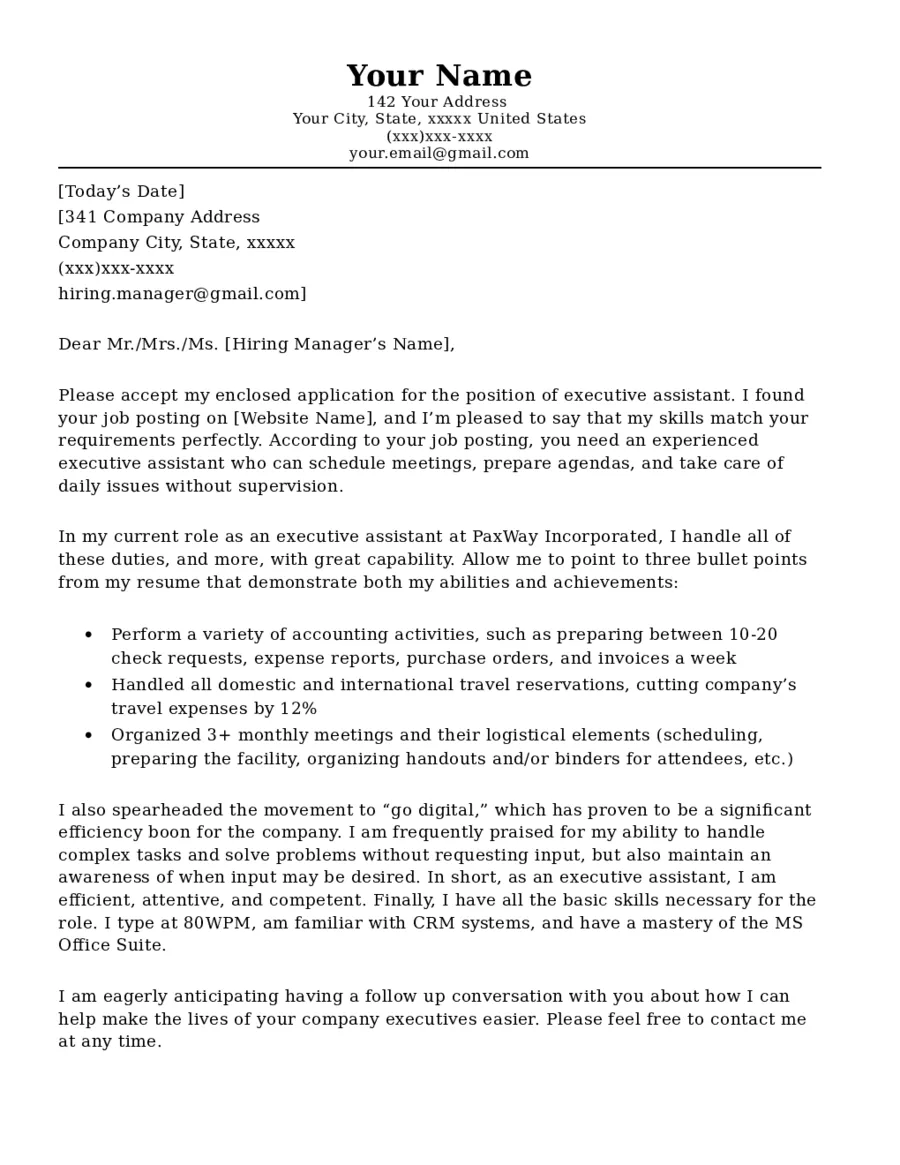
Proper formatting is crucial for your cover letter; it demonstrates your attention to detail and professionalism. Use a standard, easy-to-read font such as Times New Roman, Arial, or Calibri, with a font size between 10 and 12 points. Keep the formatting consistent throughout the document. Use single spacing within paragraphs and a double space between paragraphs. Align your text to the left and avoid excessive use of bolding, underlining, or italics. Maintain consistent margins (typically 1 inch on all sides). Save your cover letter as a PDF to preserve the formatting across different devices and ensure it appears as intended. Correct formatting makes the cover letter easy to read and reflects favorably on your professionalism.
Proofreading and Editing
Proofreading and editing are vital steps in crafting a successful cover letter. Before submitting your application, thoroughly proofread your letter for any grammatical errors, typos, and punctuation mistakes. These errors can detract from your professionalism and reduce your chances of being considered. Read your cover letter aloud, as this helps catch mistakes you might miss when reading silently. Ask a friend, family member, or career advisor to review your letter for clarity, accuracy, and overall effectiveness. Ensure your language is clear, concise, and free of jargon. Proper proofreading and editing will ensure that your cover letter presents you in the best possible light and highlights your attention to detail and communication skills. This process improves your chances of making a positive first impression.
Office Job Cover Letter Examples
Reviewing examples of cover letters for specific office jobs can provide valuable insights and guidance for writing your own. These examples offer templates to understand the typical format and structure of a cover letter for office positions. Examples will show how to tailor your skills and experience to the job description, providing specific examples of how you can create a positive impression. Looking at these real-world examples can inspire ideas and provide a practical framework to create a compelling cover letter that emphasizes your strengths and boosts your chances of success in your job search. Ensure that you adapt any example to reflect your unique skills, experiences, and the specific requirements of the jobs you’re applying for. Don’t copy a letter word for word, but use examples as a basis.
Example Cover Letter for Administrative Assistant
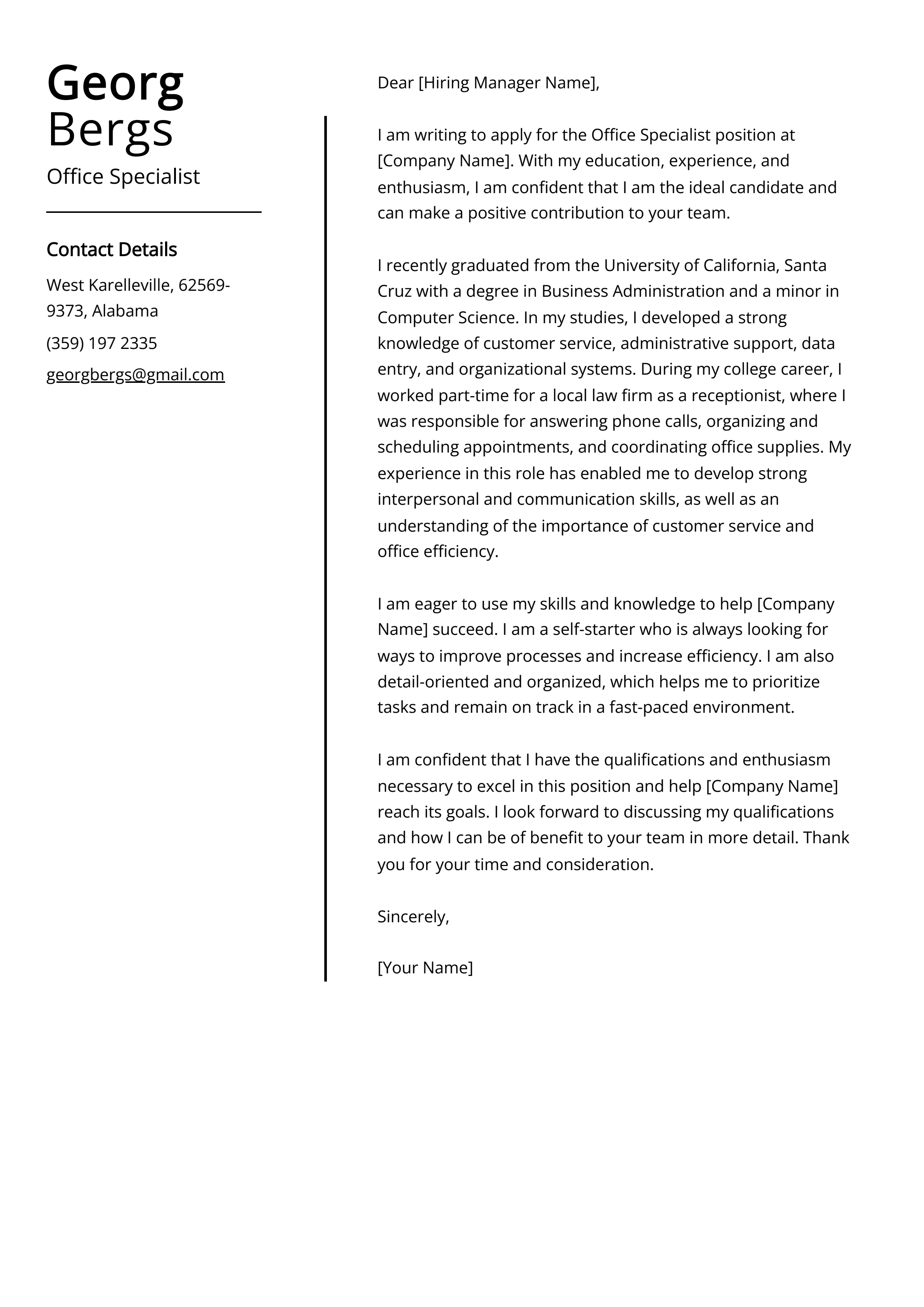
An administrative assistant cover letter should highlight organizational skills, communication abilities, and proficiency in office software. It’s important to demonstrate a proactive approach to managing administrative tasks, supporting team members, and maintaining office efficiency. Showcase experience with scheduling, managing correspondence, and maintaining records. Mention any experience with travel arrangements, event coordination, or customer service. Tailor your letter to the specific requirements of the administrative assistant position by emphasizing skills and providing concrete examples of your accomplishments. Focus on demonstrating that you can support the smooth functioning of the office and contribute to the overall success of the organization. Show your ability to prioritize tasks, manage multiple projects, and maintain a professional demeanor. Highlighting strong communication and organizational skills is important for this position.
Example Cover Letter for Receptionist
A receptionist cover letter should emphasize your communication skills, customer service abilities, and professional demeanor. Highlight your experience in greeting visitors, answering phone calls, managing schedules, and handling correspondence. Showcase your ability to multitask, manage a front desk efficiently, and provide a welcoming environment. Highlight your experience with office software and any experience with multitasking, ensuring smooth operation of office tasks. If the job posting has additional needs, be sure to highlight them by showing off any experience in those areas. Demonstrate how you provide excellent customer service and create a positive first impression for visitors. Detail any experience with managing phone systems, handling mail, and managing appointments. Stressing skills is important for this position.
Example Cover Letter for Data Entry Clerk
A cover letter for a data entry clerk should emphasize accuracy, attention to detail, and proficiency in data entry software. Highlight your typing speed, accuracy rates, and any experience with specific data entry systems. Showcase your ability to organize and manage data efficiently, with examples. You may mention any experience with spreadsheets, databases, or other data management tools. Tailor your letter to the specific requirements of the job, highlighting relevant skills and showing how you ensure data integrity and organization. Demonstrate that you have the skills and precision to enter data accurately and efficiently and that you can keep organized.
Common Mistakes to Avoid
Several common mistakes can undermine the effectiveness of your cover letter. To increase your chances of getting hired, be aware of these pitfalls and avoid them. One common mistake is not tailoring your cover letter to the specific job. Generic cover letters that are not customized to the role or company demonstrate a lack of interest and preparation. Another error is including too much information, making the letter lengthy and unfocused. Keep it concise, and focus on the most relevant skills and experiences. Avoiding these common mistakes will significantly improve your cover letter’s effectiveness and increase your chances of landing an interview.
Grammatical Errors and Typos
Grammatical errors and typos are among the most significant mistakes you can make in a cover letter. They can create a negative impression, suggesting that you are careless or inattentive to detail. Always proofread your cover letter carefully before submitting your application. Use a spell-checker and grammar-checker, but don’t rely on them entirely; these tools can miss subtle errors. Read the letter aloud to catch any awkward phrasing or inconsistencies. Consider having a friend or family member review it as well. Correct grammar and spelling show you are professional and reliable, increasing the chances of making a good impression.
Generic Cover Letters
Generic cover letters are a major turnoff for hiring managers. These letters are not tailored to the specific job or company. They often contain vague language and fail to demonstrate a clear understanding of the role or the organization’s needs. Taking the time to tailor your cover letter shows you have done your research and are genuinely interested in the position. Avoid using generic phrases and clichés. Use specific examples to showcase your skills and experience. Highlight the key requirements of the job description and explain how your qualifications match those needs. This personalized approach will significantly increase your chances of standing out and getting an interview.
Lengthy Cover Letters
Lengthy cover letters can be a significant deterrent to getting hired. Hiring managers are busy and often have many applications to review. A cover letter should be concise and easy to read, typically one page or less. Stick to the most relevant information and avoid including unnecessary details or lengthy explanations. Focus on demonstrating your value and how your skills align with the job requirements. Use clear and concise language, and avoid rambling. Remember, the cover letter is designed to capture the reader’s attention and encourage them to review your resume. Keep it short, to the point, and make every word count.
